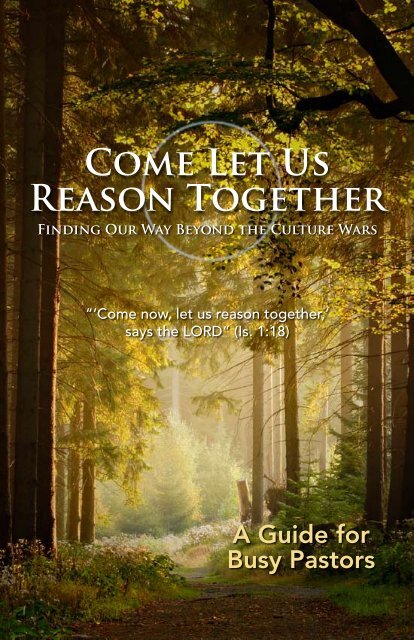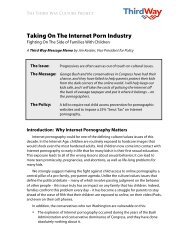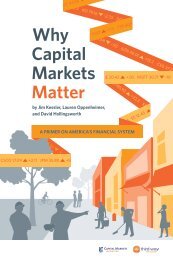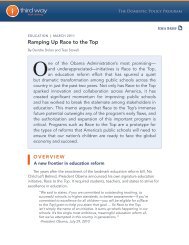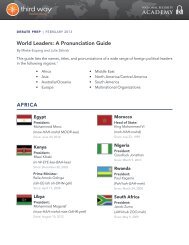Come Let Us Reason Together - Third Way
Come Let Us Reason Together - Third Way
Come Let Us Reason Together - Third Way
Create successful ePaper yourself
Turn your PDF publications into a flip-book with our unique Google optimized e-Paper software.
<strong>Come</strong> <strong>Let</strong> <strong>Us</strong><br />
<strong>Reason</strong> <strong>Together</strong><br />
Finding Our <strong>Way</strong> Beyond the Culture Wars<br />
“‘<strong>Come</strong> now, let us reason together,’<br />
says the LORD” (Is. 1:18)<br />
A Guide for<br />
Busy Pastors
Dear Fellow Pastor,<br />
We are writing to invite you to come together with<br />
a growing group of pastors who are leading their<br />
congregations to embrace a new approach to some of<br />
the most difficult issues in our nation’s life.<br />
For too long, forces in our country have fueled a<br />
polarizing conflict over hot-button issues like abortion,<br />
issues related to gay and lesbian people, and the role<br />
of religion in public life. But as pastors, we realized that<br />
these so-called “culture wars” have been waged along<br />
political battle lines that don’t fit the body of Christ<br />
we serve very well—few congregations (or pastors)<br />
fit comfortably into one category all the time. This is<br />
especially true for the younger generation, who are<br />
looking for new leadership beyond the rancor of past<br />
debates.<br />
More and more of us have been realizing that there<br />
are overlooked ways to make progress on these issues<br />
together even amidst disagreement. And we can do it<br />
without compromising our core values and beliefs. This<br />
new <strong>Come</strong> <strong>Let</strong> <strong>Us</strong> <strong>Reason</strong> <strong>Together</strong> path represents an<br />
exciting, practical approach to the most divisive cultural<br />
issues of our day.<br />
This pastor guide, <strong>Come</strong> <strong>Let</strong> <strong>Us</strong> <strong>Reason</strong> <strong>Together</strong>:<br />
A Guide for Busy Pastors, details this valuable<br />
approach and describes how you can add your voice<br />
to a growing chorus. It is the result of two years of<br />
conversation among pastors and other Christian<br />
leaders. These Christian leaders were joined by an<br />
unlikely group of progressives led by <strong>Third</strong> <strong>Way</strong>,
a progressive think tank in Washington, DC, who<br />
shared our reconciling spirit and were also committed<br />
to finding a path beyond the culture wars to common<br />
ground. We hope this pastor guide will facilitate<br />
conversations in churches, on college campuses, and<br />
at kitchen tables in Christian households across<br />
the country.<br />
We invite you to join the rising group of pastors<br />
who are looking for ways to be faithful agents of<br />
reconciliation on these issues.<br />
With blessings to you and your ministry,<br />
Rev. Dr. Joel C. Hunter<br />
Senior Pastor, Northland, A Church Distributed (Longwood, FL)<br />
Rev. Bob Roberts, Jr.<br />
Senior Pastor, NorthWood Church (Keller, TX)<br />
Rev. Gabriel Salguero<br />
Senior Pastor, The Lamb’s Church (New York, NY)<br />
Executive, The Latino Leadership Circle
COME LET US REASON TOGETHER<br />
FIVE QUESTIONS & ANSWERS<br />
FOR BUSY PASTORS<br />
What are the culture wars?<br />
The term “culture wars” describes the entrenched public conflict<br />
between “liberals” (or progressives) and “conservatives,” especially<br />
when it comes to hot-button issues like abortion, issues related<br />
to gay and lesbian people, and the role of religion in our nation’s<br />
public life.<br />
These conflicts have more often than not produced polarization,<br />
hostility, and stalemates. They have not only hindered progress for<br />
either side, but they have also made advancements for the greater<br />
good nearly impossible.<br />
How do the culture wars affect congregations if<br />
they don’t fit neatly into the categories of liberal or<br />
conservative, Republican or Democrat?<br />
The problem with the culture wars is that they seek to artificially<br />
divide all of us. Few people or congregations or pastors fit simply<br />
into one category all the time. In fact, these labels are political<br />
terms that are not the best way to describe churches or Christians.<br />
So, what are the options for those who think that faithfulness<br />
requires thinking independently and evaluating issues individually?<br />
More and more of us have been realizing that we can find ways to<br />
make progress on some things together, even if we differ on other<br />
issues. And we can do it without compromising our core values<br />
and beliefs.<br />
How do I help my congregation deal with<br />
controversial issues without anger and accusation?<br />
One of the toughest things to do as a pastor is deal with hard<br />
issues in a way that builds up rather than divides. The <strong>Come</strong> <strong>Let</strong><br />
3
4<br />
<strong>Us</strong> <strong>Reason</strong> <strong>Together</strong> approach charts a new way to calmly address<br />
some very divisive issues while being obedient to the scriptures<br />
we preach. We can teach our congregations to be agents of<br />
reconciliation while advancing the heart of the Gospel.<br />
Why should I raise these controversial issues?<br />
Isn’t it safer to avoid them?<br />
Our country and the next generation desperately need courageous<br />
leadership on these issues that works to stake out faithful common<br />
ground. Young people especially have been turned off by the<br />
divisive rhetoric and are looking to the church for a fresh word that<br />
finds common ground without compromising principles. This new<br />
approach to old issues represents an effective way to live out the<br />
biblical mandate to help bring healing to a divided world.<br />
What is the <strong>Come</strong> <strong>Let</strong> <strong>Us</strong> <strong>Reason</strong> <strong>Together</strong> path?<br />
The <strong>Come</strong> <strong>Let</strong> <strong>Us</strong> <strong>Reason</strong> <strong>Together</strong> approach balances a passion<br />
for standing for what is right with a calling to be peacemakers in<br />
the world. It charts a new, practical way of approaching the most<br />
divisive cultural issues of our day: the role of religion in public life,<br />
abortion, gay and lesbian issues, torture, and immigration.
COME LET US REASON TOGETHER<br />
WHAT THE BIBLE SAYS<br />
The Bible teaches us to seek the well-being and peace of the city<br />
in which we dwell (Jer. 29:7). However, the culture wars of the last<br />
few decades have torn our country apart and damaged our sense<br />
of a shared national life.<br />
God models reconciliation for us in the Bible with an approach that<br />
begins with the call, “<strong>Come</strong> let us reason together” (Isaiah 1:18).<br />
God’s call to “reason together” can function as a powerful symbol<br />
of people coming together to reconcile their differences through<br />
respectful engagement.<br />
Four biblical themes serve as the foundation to this new approach:<br />
Jesus Christ modeled peacemaking, healing, and<br />
reconciliation in his ministry.<br />
Jesus said that the arrival of the kingdom of God would be<br />
characterized by reconciliation, the healing of wounds, peace,<br />
justice, and forgiveness for all (Matt. 4:17; Matt. 6:10; Mark 1:14-15;<br />
Luke 17:20-21; II Cor. 5:11-21). The Bible describes Jesus as Prince<br />
of Peace, the great physician, a mediator, and a reconciler (Is. 9:6;<br />
John 14:27; Mark 2:17; Luke 2:14-15; 7:18-23).<br />
“For to us a child is born, to us a son is given, and the<br />
government will be on his shoulders. And he will be called<br />
Wonderful Counselor, Mighty God, Everlasting Father,<br />
Prince of Peace.” (Isaiah 9:6)<br />
5
6<br />
God values a well-functioning society.<br />
Creating a just, well-functioning society is part of our calling in<br />
creation (Gen. 1:27-28). In a democracy—where government is of,<br />
by, and for the people—a key part of this biblical calling is to help<br />
our government live up to this God-given responsibility to render<br />
justice and provide for peace and general well-being (Rom. 13:1-7;<br />
I Pet. 2:13-17).<br />
“Submit yourselves for the Lord’s sake to every authority<br />
instituted among men: whether to the king, as the supreme<br />
authority, or to governors, who are sent by him to punish<br />
those who do wrong and to commend those who do right.<br />
For it is God’s will that by doing good you should silence<br />
the ignorant talk of foolish men. Live as free men, but<br />
do not use your freedom as a cover-up for evil; live as<br />
servants of God.” (I Pet. 2:13-17)<br />
Finding a common path forward with our fellow<br />
citizens is a way to live out the Christian virtues of<br />
love, justice, and hospitality.<br />
The National Association of Evangelicals (NAE) has eloquently<br />
summarized this calling: “We bless our neighbors by making good<br />
laws…that contribute to the common good and help alleviate the<br />
ills of society” (NAE, “For the Health of the Nation”). Christ calls<br />
Christians to civic engagement as part of service to God and<br />
neighbor (Matt. 22:36-40; Phil 2:4-8).<br />
“Each of you should look not only to your own interests,<br />
but also to the interests of others. Your attitude should<br />
be the same as that of Christ Jesus: Who, being in very<br />
nature God, did not consider equality with God something<br />
to be grasped, but made himself nothing, taking the very<br />
nature of a servant, being made in human likeness.”<br />
(Phil. 2:4-8)
How we live out our calling to civic engagement is<br />
part of our public witness to society.<br />
As a large and influential part of American society, we have a<br />
special responsibility not only to support the right policies but also to<br />
engage our fellow citizens in a way that is worthy of the gospel, using<br />
Christ-honoring methods that are beyond reproach. If our actions as<br />
individual believers or a faith community fuel divisions rather than<br />
heal them, they can harm our nation and the cause of Christ. In both<br />
our private lives and in our public engagement, we are ambassadors<br />
for Christ (Lev. 11:45; Col. 1:22; II Cor 5:16-20; Titus 2:7-8).<br />
“And God has committed to us the message of<br />
reconciliation. We are therefore Christ’s ambassadors, as<br />
though God were making his appeal through us.”<br />
(II Cor. 5:16-20)<br />
7
COME LET US REASON TOGETHER<br />
A WAY BEYOND THE CULTURE WARS<br />
<strong>Come</strong> <strong>Let</strong> <strong>Us</strong> <strong>Reason</strong> <strong>Together</strong> represents a hopeful, new<br />
approach to faithful Christian political engagement. Our nation<br />
is showing signs of emerging from a long period of particularly<br />
divisive politics. This era has torn our country apart over issues<br />
such as abortion, homosexuality, torture, and immigration. These<br />
battles have caused deep wounds and generated mistrust on<br />
all sides.<br />
But there is a great opportunity to move forward in “such a<br />
time as this” (Esther 4:14). God is raising up a group of pastors<br />
who desire to heal our divided nation. We are finding common<br />
ground that achieves real progress on these tough issues without<br />
compromising core beliefs.<br />
The <strong>Come</strong> <strong>Let</strong> <strong>Us</strong> <strong>Reason</strong> <strong>Together</strong> path includes the following<br />
five common ground goals on the most divisive cultural issues<br />
of our time:<br />
Affirming an appropriate role for religion in the<br />
public square.<br />
We can agree that religious beliefs and religious diversity are<br />
vital for a healthy democratic society. Religion plays an important<br />
public, and not just private, role in American life. A vibrant public<br />
role for religion need not conflict with the American tradition of<br />
non-establishment of religion.<br />
Reducing abortions through common ground policies.<br />
We can agree on a goal of reducing abortions in America through<br />
policies that address the circumstances that lead to abortion:<br />
preventing unintended pregnancies, supporting pregnant women<br />
and new families, and increasing support for adoption.<br />
9
10<br />
Protecting the rights of gay and lesbian people<br />
to earn a living.<br />
We can agree that all people have God-given human dignity and<br />
should be able to earn a living, whatever our beliefs are about<br />
homosexuality. Protecting the basic rights of all—even those with<br />
whom one disagrees—is a proud American tradition and a high<br />
moral and religious calling. Based on a common commitment to<br />
love of neighbor and the Golden Rule, we can support a policy<br />
that makes it illegal to fire, refuse to hire, or refuse to promote<br />
employees based on their sexual orientation. We also believe that<br />
there must be a clear exemption for religious organizations.<br />
Renouncing Torture.<br />
We can agree that the use of torture and cruel, inhuman, or<br />
degrading treatment against prisoners is immoral, unwise, and<br />
un-American. The sanctity and dignity of every human life is nonnegotiable.<br />
The threats evident in the events of 9/11 are real, but<br />
they must be met with a courageous moral and legal framework<br />
that reflects our deepest values. We are also guided on this issue<br />
by the simple and clear principle of the Golden Rule: we will not<br />
authorize or use any methods of interrogation that we would not<br />
find acceptable if used against Americans, be they civilians<br />
or soldiers.<br />
Supporting Secure and Compassionate<br />
Immigration Reform.<br />
We can agree that we need comprehensive immigration reform<br />
that creates an earned path to citizenship and protects families,<br />
while still securing our borders and treating American citizens<br />
fairly. Our immigration policies have too often been driven by fear<br />
instead of the biblical values of compassion and hospitality. We<br />
agree that it is possible and complementary to protect our borders,<br />
protect all families, and protect these American values.
COME LET US REASON TOGETHER<br />
FREQUENTLY ASKED QUESTIONS<br />
Why should Christians care about ending the<br />
culture wars?<br />
1. Because the rancor of the culture wars have damaged<br />
our nation and the cause of Christ, especially among<br />
increasingly disillusioned youth. For example, the Barna<br />
Group recently found that American young people have<br />
highly negative perceptions of contemporary Christianity<br />
(Kinnaman 2007). The <strong>Come</strong> <strong>Let</strong> <strong>Us</strong> <strong>Reason</strong> <strong>Together</strong> path<br />
holds out the promise of connecting to younger Americans<br />
who have in part rejected Christianity because they<br />
reject the divisive style of politics that they associate with<br />
Christianity.<br />
2. Because Christians are called to mirror Jesus’ model of<br />
peace, love, and reconciliation. God commands us, from<br />
the moment of Creation, to govern harmoniously and care<br />
about the well-being of society.<br />
3. Because God’s love and Jesus’ example compel us to be<br />
servant leaders—to act in ways that look out not just for our<br />
own interests but for the interests of all.<br />
What is the <strong>Come</strong> <strong>Let</strong> <strong>Us</strong> <strong>Reason</strong> <strong>Together</strong> path?<br />
<strong>Come</strong> <strong>Let</strong> <strong>Us</strong> <strong>Reason</strong> <strong>Together</strong> represents a practical, hopeful<br />
approach to finding solutions for divisive cultural issues based<br />
on our shared, deeply held values. We take seriously the call to<br />
“reason together” in covenant with God and one another, and we<br />
are calling for a truce in the culture wars.<br />
This new path is guided by three principles:<br />
1. We are committed to moving forward together on concrete<br />
issues through creative thinking and a principled dialogue,<br />
without compromising our core convictions.<br />
11
12<br />
2.<br />
3.<br />
We are committed to listening with new ears and learning<br />
from one another.<br />
We mutually call for renewed civility on these difficult issues.<br />
What about taking a stand on biblical values?<br />
Taking a biblical stand on issues where the Bible is clear is critical.<br />
<strong>Come</strong> <strong>Let</strong> <strong>Us</strong> <strong>Reason</strong> <strong>Together</strong> is not about compromising core<br />
convictions but about finding a creative, new path forward based<br />
on shared values. We can be faithful to biblical values while<br />
following Christ’s example of reconciliation and working together<br />
where we can.<br />
What have Christian leaders said about <strong>Come</strong> <strong>Let</strong><br />
<strong>Us</strong> <strong>Reason</strong> <strong>Together</strong>?<br />
More than twenty prominent Christian leaders signed our <strong>Come</strong><br />
<strong>Let</strong> <strong>Us</strong> <strong>Reason</strong> <strong>Together</strong> Governing Agenda at its launch in early<br />
2009, and the list is steadily growing. The following is a sample of<br />
the endorsements.<br />
I wholeheartedly endorse the <strong>Come</strong> <strong>Let</strong> <strong>Us</strong> <strong>Reason</strong><br />
<strong>Together</strong> Governing Agenda. This common ground<br />
initiative holds out an unprecedented opportunity for<br />
Evangelicals and progressives—two communities that<br />
have held deep distrust for one another in the past—to<br />
come together as ambassadors of reconciliation on some<br />
of the toughest cultural issues of our time. This concrete<br />
policy agenda does not entail compromise from either<br />
group. Rather, it charts for the President and Congress<br />
a fresh course that can move our country beyond<br />
polarization, hostility and stagnation to a place that we can<br />
all agree is good.<br />
Rev. Dr. Joel C. Hunter<br />
Senior Pastor, Northland, A Church Distributed (Longwood, FL);<br />
author of A New Kind of Conservative
The goal of <strong>Come</strong> <strong>Let</strong> <strong>Us</strong> <strong>Reason</strong> <strong>Together</strong> is a thoroughly<br />
biblical one: healing a bitter cultural polarization in<br />
the United States. This is an ambitious but thoroughly<br />
appropriate goal for Christians whose eyes are fixed on<br />
Christ and the reign of God. The policy solutions share a<br />
common grounding in respect for human dignity, which<br />
ought to be a core principle for Christians—and all people<br />
of good will. I support this project because it fits with who I<br />
seek to be as a Christian.<br />
David P. Gushee, Ph.D.<br />
Distinguished Professor of Christian Ethics, McAfee School of<br />
Theology, Mercer University; author of The Future of Faith in<br />
American Politics: The Public Witness of the Evangelical Center<br />
As a conservative Christian, I strongly support the <strong>Come</strong><br />
<strong>Let</strong> <strong>Us</strong> <strong>Reason</strong> <strong>Together</strong> Governing Agenda—an effort<br />
to end the culture wars that have produced a destructive<br />
and unchristian partisanship in American public life.<br />
I count myself a member of a rising generation of<br />
evangelicals calling for a rapid infusion of civility and grace<br />
into a political culture where faith has often produced<br />
divisiveness. Our unwavering commitments to the sanctity<br />
of life and the protection of marriage should not preclude<br />
working for the common good alongside people with whom<br />
we must sometimes lovingly disagree.<br />
Jonathan Merritt<br />
Founder, Southern Baptist Environment and Climate Initiative<br />
We have had too much shouting and fist waving in recent<br />
years in our debates about key issues of public policy. It is<br />
time to lower the rhetoric and see if we can find practical<br />
solutions, ones that allow all of us to preserve the integrity<br />
of our deepest convictions as we look for appropriate ways<br />
of living together as citizens of a pluralistic society. It is<br />
time to “come, let us reason together.”<br />
Richard J. Mouw, Ph.D.<br />
President, Fuller Theological Seminary<br />
13
14<br />
In my early days of ministry I focused on what I believed,<br />
who agreed with me, and how we would network. The only<br />
problem was that it led to living an isolated, if not monastic,<br />
and cocooned faith in a globalized and connected world.<br />
As my ministry has matured, I have learned to interact<br />
with those who take opposite positions and hear them out.<br />
That can be scary, because in the process of wanting to<br />
change others we sometimes wind up changing! There<br />
has never been a time when cultures and people are more<br />
divided, while at the same time being more connected than<br />
today. The <strong>Come</strong> <strong>Let</strong> <strong>Us</strong> <strong>Reason</strong> <strong>Together</strong> approach is<br />
not only timely and practical, it is a much needed solution<br />
to the unproductive stalemates we have experienced on<br />
important, yet difficult cultural issues. This new path is<br />
promising for pastors who want to be faithful agents of<br />
reconciliation in our polarized but interdependent culture.<br />
Rev. Bob Roberts, Jr.<br />
Senior Pastor, NorthWood Church (Keller, TX); author of<br />
Glocalization: How Followers of Christ Engage the New Flat Earth<br />
For too long our country has been divided between<br />
left and right, blue and red on critical social issues. As<br />
Christians we are called to the ministry of reconciliation<br />
without compromising our integrity. The <strong>Come</strong> <strong>Let</strong> us<br />
<strong>Reason</strong> <strong>Together</strong> Governing Agenda is a giant step<br />
forward toward healing divides and finding the ties that<br />
lead to the common good. The Latino Leadership Circle<br />
is committed to being part of this new mosaic. Our<br />
commitment to Christ and humanity demands no less.<br />
Rev. Gabriel Salguero<br />
Senior Pastor, The Lamb’s Church (New York, NY)<br />
Executive, The Latino Leadership Circle
I strongly support the <strong>Come</strong> <strong>Let</strong> <strong>Us</strong> <strong>Reason</strong> <strong>Together</strong><br />
Governing Agenda—a landmark effort that holds out<br />
the promise of locating common ground between two<br />
communities who have in recent times mistrusted and<br />
been too ignorant of each other. This new way represents<br />
a biblically faithful path for evangelicals and a real<br />
opportunity to bring a divided nation together at this critical<br />
time in our history.<br />
Ronald J. Sider, Ph.D.<br />
President, Evangelicals for Social Action; author of The Scandal<br />
of the Evangelical Conscience and 28 other books<br />
The Governing Agenda also received endorsements from a<br />
number of other prominent leaders including David Black, Tony<br />
Campolo, Gabe Lyons, Brian McLaren, Steve Monsma, Samuel<br />
Rodriguez, Glen Stassen, Paul de Vries, Jim Wallis, Tyler Wigg-<br />
Stevenson, and others.<br />
To see the full list of endorsers, visit our website at:<br />
http://comeletusreason.org<br />
15
COME LET US REASON TOGETHER<br />
STEPS PASTORS AND CHURCHES CAN TAKE<br />
There are a number of steps that local pastors and churches can<br />
take to help bring about healing in our local communities and in<br />
our nation. The resources referenced below can be found at<br />
http://comeletusreason.org/.<br />
<strong>Let</strong> your voice be heard.<br />
• Join a growing network of other religious leaders who are<br />
endorsing the <strong>Come</strong> <strong>Let</strong> <strong>Us</strong> <strong>Reason</strong> <strong>Together</strong> movement.<br />
• Join the <strong>Come</strong> <strong>Let</strong> <strong>Us</strong> <strong>Reason</strong> <strong>Together</strong> movement on<br />
Facebook at: www.facebook.com/comeletusreasontogether<br />
Organize a <strong>Come</strong> <strong>Let</strong> <strong>Us</strong> <strong>Reason</strong> <strong>Together</strong> adult<br />
Sunday school series.<br />
• Study the background paper, <strong>Come</strong> <strong>Let</strong> <strong>Us</strong> <strong>Reason</strong><br />
<strong>Together</strong>: A Fresh Look at Shared Cultural Values Between<br />
Evangelicals and Progressives.<br />
• Study the biblical foundations of the policies. You can check<br />
out our suggested four-week discussion guide.<br />
• Both of these resources are available on our website.<br />
Plan a <strong>Come</strong> <strong>Let</strong> <strong>Us</strong> <strong>Reason</strong> <strong>Together</strong> worship<br />
service that focuses on Christ-honoring public<br />
engagement, even on tough issues.<br />
• Give a sermon based on one of the common ground<br />
solutions above, such as reducing abortions through<br />
common good solutions.<br />
• You can check out sermon resources online on our website.<br />
17
18<br />
Convene a <strong>Come</strong> <strong>Let</strong> <strong>Us</strong> <strong>Reason</strong> <strong>Together</strong><br />
discussion at your local clergy council or<br />
associational meeting.<br />
Add your name in support of the “Evangelical<br />
Declaration Against Torture.”<br />
• Go to: http://tinyurl.com/EHRtorture
COME LET US REASON TOGETHER<br />
FURTHER STUDY MATERIALS<br />
Books:<br />
David Gushee, The Future of Faith in American Politics: The Public<br />
Witness of the Evangelical Center (Baylor University Press, 2008).<br />
Joel Hunter, A New Kind of Conservative (Regal, 2008).<br />
David Kinnaman and Gabe Lyons, UnChristian: What a New Generation<br />
Really Thinks about Christianity…And Why it Matters (Baker, 2007).<br />
Ronald J. Sider and Dianne Knippers, Toward an Evangelical Public<br />
Policy: Political Strategies for the Health of the Nation (Baker, 2005).<br />
Find it on the Web:<br />
• More information about this exciting project, the broad coalition<br />
of supporters, and details about the policies can be found at our<br />
website: http://comeletusreason.org<br />
•<br />
•<br />
See also the National Association of Evangelical’s historic<br />
document on evangelical civic engagement:<br />
http://www.nae.net/images/civic_responsibility2.pdf<br />
Join us on Facebook at:<br />
www.facebook.com/comeletusreasontogether<br />
19


